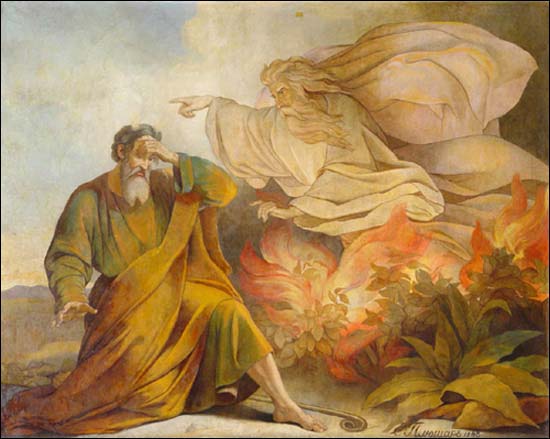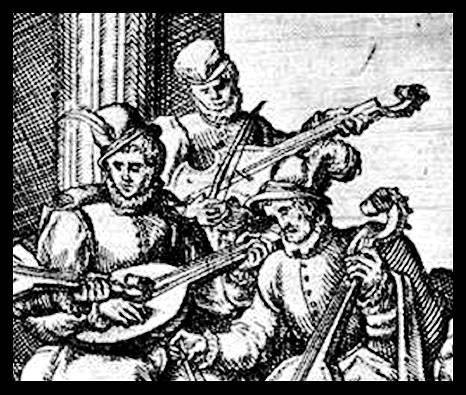“I am that I am” says William Shakespeare…
Then Moses said vnto god, Behold, when I shall come vnto the children of Israel, and shall say vnto them, the god of your fathers hath sent me vnto you: if they say vnto me, What is his name? what shall I say vnto them?
And God answered Moses, I Am That I Am. Also he said, thus shalt thou say vnto the children of Israel, I Am hath sent me vnto you.
Exodus 3: 13-14, Geneva Bible 1599
Many thanks to Sarah B. for her useful comment on my last post, “He that will forget God”:
“Your odd leap from the Richard conversation to the “I am who I am” thing seems illogical. The phrase doesn’t figure anywhere in the conversation.”
You’re right, Sarah, I did take quite a leap, depending more on innuendo and intuition than straight exposition and fact. But I do appreciate your expectation of logic, and will try to add a few stepping stones to make it easier to follow what I only suggested a few weeks ago:
1). Elizabeth characterized the person responsible for portraying her as Richard the Second as “He that will forget God.”
2). A person who uses God’s own phrase, “I am that I am” without remembering that he or she is what they are by the grace of God has, quite literally, forgotten God.
3). William Shakespeare, who was not brought to trial, or even brought in for questioning regarding his bit part in the Essex Rebellion, forgot to mention God when he said “I am that I am” in Sonnet 121. Edward de Vere also forgot to mention God when he proclaimed himself “I am that I am” in a personal letter admonishing his father-in-law.
4). Therefore, William Shakespeare and Edward de Vere – two praised dramatists with well-documented ties to the London theater world – both qualify for consideration as the subject of Lambarde and Elizabeth’s conversation, that unnamed he of the “wicked imagination”, aka “he that will forget God.”
Edward de Vere seems to hold the better claim, being a creature “made” by Elizabeth, who granted him a thousand pounds a year when he was bankrupt, for naught but keeping state in respectable style, so as to uphold the outward awe of England’s nobility. And yet, if the earl of Oxford had anything at all to do with William Shakespeare and his poetry, by way of collaboration or subversion, for some reason, he neglected to claim responsibility for his contributions. Perhaps like “Captain Tucca” of Satiromastix, he was content to let others take “the guilt of conscience” for his dramatic devices.
Of course, Elizabeth may have had many other manifestations of forgetting God in mind, when voicing her ire towards the gentleman with the “wicked imagination”. She may have found evidence of a proud, humanist spirit in Shakespeare’s plays. She may have recognized the perplexing impossibility of assessing Shakespeare’s true faith from reading his tragedies, histories and comedies. She may have looked in vain for humble praise of God or adoration of Jesus Christ in Shakespeare’s published poems.
Did Elizabeth know of Shakespeare’s use of the phrase, “I am that I am”? Perhaps, perhaps not, since his “sugared sonnets” may have been circulating among a circle of friends that didn’t include her Majesty. And yet, that circle quite likely included Richard Barnfield, a friend of Meres, and intimate of high-society figures such as Penelope Rich (sister of Essex) and William Stanley, earl of Derby. Barnfield’s saucy and salacious poem of 1596, brashly entitled Cynthia and dedicated to the queen, certainly caused more than a passing frown of consternation. It isn’t hard to imagine that someone who had Shakespeare’s private sonnets in hand, sonnets that were being eagerly read among a privileged coterie, would have enjoyed sharing such charming booty with the ever-romantic Virgin Queen.
As for Edward de Vere’s “I am that I am” assertion, Elizabeth’s “spirit”, William Cecil, Lord Burghley, may have felt it his duty to let her majesty know of the incredibly arrogant letter he’d received from her proud subject. As a devout man with Puritan inclinations, Lord Burghley would have immediately recognized the theological implications of de Vere’s usurping God’s sacred name for his own, tawdry ends. Chances are he would have felt compelled to issue a stiff corrective to such presumption.
This, I believe, is what actually happened. Shortly after Burghley received this letter, a legal complaint was allowed to proceed in which Edward de Vere’s legitimacy came under intense scrutiny. Incredibly embarrassing details about John de Vere’s erratic love life were made public, including a lurid tale about the rape and mutilation of the 16th earl of Oxford’s second, bigamous wife, Joan Jockey. Both Elizabeth and Burghley had the power to squash these proceedings, but did not. Could it be that they both agreed that Edward de Vere needed a bit more humbling? (For more on the connections between Oxford’s letters to his father-in-law Burghley, and Shakespeare’s Sonnet 121, see Robert Detobel’s short essay, “I am that I am”).
In any case, Elizabeth didn’t need to see this letter to know Edward de Vere as “He that will forget God”. Twenty years before her conversation with Lambarde, she’d read the testimony of de Vere’s cousin Henry Howard, and his former friend, Charles Arundel. To back up the accuracy of what they say that Oxford said, these men called as witness Lord Windsor, Mr. Russell and Walter Ralegh. Elizabeth could and probably did ask each of these men if Oxford really did indulge in such talk:
…his most horrible and detestable blasphemy in denial of the divinity of Christ, our Saviour, terming the Trinity as a fable, that Joesph was a wittold, and the Blessed Virgin a whore. (see Monstrous Adversary, Alan H. Nelson, p. 210)
BTW, I’d appreciate hearing from anyone who has read Jonathan Bate’s discussion of Elizabeth’s conversation with Lambarde (Soul of the Age, 2009), and can either comment on his challenge to the authenticity of the record, or fill in some of the gaps from those pages unavailable on Google books!



Really….. Seriously…… your problem is you don’t want to see the forrest through the trees. No one likes to look at incest and especially concerning our good virgin queen Elizabeth. Why mask Shake -Spear if there wasn’t a very good reason to. All your dribble doesn’t add up to what is simple. Edward de Vere was a changling put in the home of the 16th earl of Oxenford after he was married quickly to Marg Golding an employee of Lord Cecil. He had something on him that made him go along with the plan. He was favoured and all roads lead to Elizabeth being his natural mother or why else hide him???????? Why was Cecil made her minister because she could trust him with her life’s secrets. He was the king maker, queen in this instance. Paintings leave clues to this same story. Get over yourself Edward deVere was Shake-Spear, there was no William about him.
shelley
Shelly:
As I’ve written elsewhere on this site, it is much more likely that Edward de Vere’s mother was Joan Jockey, John de Vere’s second, bigamous wife.
Given the close links between the earls of Oxford and the Howard family, and the recent execution of Henry Howard for treason, it’s highly unlikely that John de Vere’s household would have been considered a safe place to lodge a Tudor bastard.
Not only that, John de Vere was obviously quite unstable at this time – perhaps from the shock of seeing his brother-in-law beheaded, followed by the rape and mutilation of his wife Joan. He wouldn’t have been a wise choice of surrogate father for any child.
Your problem, Shelley, is your lack of documentary evidence in support of your theory. Can you show any communication whatsoever between Elizabeth and John de Vere – or any other of the principals in the Prince Tudor Fantasy – in the period between 1546 and 1550?
I reported in Shakespeare Matters a few months ago that the crucial phrase “I am that I am” also occurs in a 1578 prayer–
“Oxfordians (along with Stratfordians) have always assumed this phrase in Sonnet 121 is solely a biblical echo of Exodus 3:14… In 1578, prayers written by Edward Dering (1540?-1576) were published. Here’s the beginning of ‘A prayer to be said before the studying or reading of holy Scripture’–
‘O Heauenly Father, whatsoeuer I am, whatsoeuer I haue, whatsoeuer I know, it is only by thy free grace. For by nature I am the childe of wrath, and I am not borne a newe of fleshe and bloude, neither of the seede of man, or of the will of man. Fleshe and bloude cannot reueale the mysteries of thy Heauenly Kingdome vnto mee: but by thy blessed will I am that I am, and by the same knowe I that I knowe.’
De Vere loved complexity and ambiguity. Now we know ‘I am that I am’ was spoken by God in Exodus, but also by the humble believer who recites this prayer. It deepens and expands the associations of this phrase.”
Thanks for the timely comment, Richard. Shakespeare and Edward de Vere didn’t have a national day called “Thanksgiving”, but no doubt were brought up to give thanks for God’s grace every day of their lives.
As you are no doubt aware (but didn’t mention in your quote from the SM article) Edward Dering’s prayer reflects the message of a New Testament use of “I am that I am” (1 Corinthians 15:10) which the Geneva Bible (unlike those in the link I’ve provided) translates as:
(If you scroll down on this link, you’ll find John Gill’s commentary on this passage, which continues the same humble message that runs through Edward Dering’s prayer.)
It seems to em that both Dering and de Vere would have found in Corinthians a model for using “I am that I am” with a “by the grace of God” humility. You say that de Vere loved complexity and ambiguity, but obviously, his contemporary, Edward Dering had no need of either when proclaiming gratitude to the Heavenly Father whom he believed had blessed him with all that he was and would ever be.
I agree with you that Dering’s prayer “deepens and expands the associations” of the phrase. What it shows is the difference between an Elizabethan who prayed and published with a sincere Halleluyah (literally, “praise Yah”) and men like William Shakespeare and Edward de Vere, who both forgot God when borrowing his “I am that I am” to speak for themselves.
Well, if all of the numerous assumptions you’ve made (Elizabeth was familiar with the sonnet, Elizabeth knew of the letter, etc., etc.) were correct then your theory could be correct as well. But there are a little bit too many unprovable (or hardly provable) assumptions for my taste. In any case, thanks for the clarification.